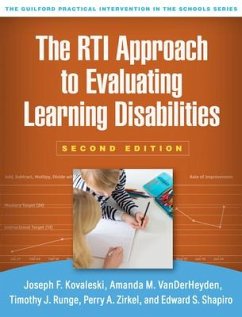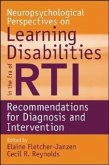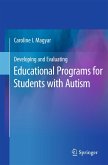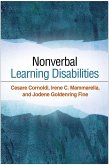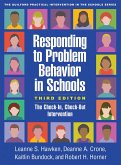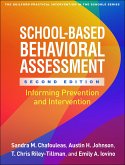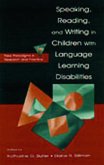Joseph F Kovaleski, Amanda M Vanderheyden, Timothy J Runge, Perry A Zirkel, Edward S Shapiro
The Rti Approach to Evaluating Learning Disabilities
Joseph F Kovaleski, Amanda M Vanderheyden, Timothy J Runge, Perry A Zirkel, Edward S Shapiro
The Rti Approach to Evaluating Learning Disabilities
- Gebundenes Buch
- Merkliste
- Auf die Merkliste
- Bewerten Bewerten
- Teilen
- Produkt teilen
- Produkterinnerung
- Produkterinnerung
From leading authorities, this indispensable work is now in a revised and expanded second edition, presenting state-of-the-art tools and procedures for practitioners. The book shows how to use response to intervention (RTI) to evaluate students for specific learning disabilities (SLD). The second edition gives increased attention to optimizing the instructional environment in the context of a multi-tiered system of support (MTSS). Procedures are described for screening at-risk students; using RTI to intensify instruction in reading, writing, and math; identifying SLD; determining eligibility…mehr
Andere Kunden interessierten sich auch für
![Neuropsychological Perspectives on Learning Disabilities in the Era of Rti Neuropsychological Perspectives on Learning Disabilities in the Era of Rti]() Neuropsychological Perspectives on Learning Disabilities in the Era of Rti78,99 €
Neuropsychological Perspectives on Learning Disabilities in the Era of Rti78,99 €![Developing and Evaluating Educational Programs for Students with Autism Developing and Evaluating Educational Programs for Students with Autism]() Caroline I. MagyarDeveloping and Evaluating Educational Programs for Students with Autism77,99 €
Caroline I. MagyarDeveloping and Evaluating Educational Programs for Students with Autism77,99 €![Nonverbal Learning Disabilities Nonverbal Learning Disabilities]() Cesare CornoldiNonverbal Learning Disabilities46,99 €
Cesare CornoldiNonverbal Learning Disabilities46,99 €![Responding to Problem Behavior in Schools Responding to Problem Behavior in Schools]() Leanne S HawkenResponding to Problem Behavior in Schools78,99 €
Leanne S HawkenResponding to Problem Behavior in Schools78,99 €![Safe and Healthy Schools Safe and Healthy Schools]() Jeffrey R SpragueSafe and Healthy Schools68,99 €
Jeffrey R SpragueSafe and Healthy Schools68,99 €![School-Based Behavioral Assessment School-Based Behavioral Assessment]() Sandra M ChafouleasSchool-Based Behavioral Assessment63,99 €
Sandra M ChafouleasSchool-Based Behavioral Assessment63,99 €![Speaking, Reading, and Writing in Children With Language Learning Disabilities Speaking, Reading, and Writing in Children With Language Learning Disabilities]() Speaking, Reading, and Writing in Children With Language Learning Disabilities198,99 €
Speaking, Reading, and Writing in Children With Language Learning Disabilities198,99 €-
-
-
From leading authorities, this indispensable work is now in a revised and expanded second edition, presenting state-of-the-art tools and procedures for practitioners. The book shows how to use response to intervention (RTI) to evaluate students for specific learning disabilities (SLD). The second edition gives increased attention to optimizing the instructional environment in the context of a multi-tiered system of support (MTSS). Procedures are described for screening at-risk students; using RTI to intensify instruction in reading, writing, and math; identifying SLD; determining eligibility for special education; and planning individualized education programs.
Hinweis: Dieser Artikel kann nur an eine deutsche Lieferadresse ausgeliefert werden.
Hinweis: Dieser Artikel kann nur an eine deutsche Lieferadresse ausgeliefert werden.
Produktdetails
- Produktdetails
- Verlag: Guilford Publications
- 2nd edition
- Seitenzahl: 272
- Erscheinungstermin: 26. Oktober 2022
- Englisch
- Abmessung: 279mm x 203mm x 23mm
- Gewicht: 862g
- ISBN-13: 9781462550456
- ISBN-10: 1462550452
- Artikelnr.: 64053790
- Herstellerkennzeichnung
- Libri GmbH
- Europaallee 1
- 36244 Bad Hersfeld
- gpsr@libri.de
- Verlag: Guilford Publications
- 2nd edition
- Seitenzahl: 272
- Erscheinungstermin: 26. Oktober 2022
- Englisch
- Abmessung: 279mm x 203mm x 23mm
- Gewicht: 862g
- ISBN-13: 9781462550456
- ISBN-10: 1462550452
- Artikelnr.: 64053790
- Herstellerkennzeichnung
- Libri GmbH
- Europaallee 1
- 36244 Bad Hersfeld
- gpsr@libri.de
Joseph F. Kovaleski, DEd, NCSP, is Professor Emeritus of Educational and School Psychology at Indiana University of Pennsylvania, where he directed the Doctoral Program in School Psychology. Dr. Kovaleski has worked as a school psychologist and district administrator in school districts in Pennsylvania and New Jersey. He directed Pennsylvania's Instructional Support Team Project and has served as a university consultant for Pennsylvania's Response to Intervention and Multi-Tiered System of Support initiatives. Dr. Kovaleski's special areas of expertise include using student data to inform instructional planning and behavior change programs. He has published a number of articles and book chapters on RTI and data-based decision making and presents frequently at national and state conferences. Dr. Kovaleski is a recipient of awards from the National Association of School Psychologists, the Pennsylvania Psychological Association, the Association of School Psychologists of Pennsylvania, and The Pennsylvania State University. Amanda M. VanDerHeyden, PhD, a policy adviser and active researcher, is President of Education Research and Consulting in Daphne, Alabama, and has a faculty affiliation with the Wheelock College of Education at Boston University. Widely published, she regularly delivers webinar, panel, and keynote sessions, including addresses to state school psychology associations and departments of education in 35 states, Singapore, China, and Portugal. Dr. VanDerHeyden has authored policy guides and position statements, has developed widely used models of academic screening, conducts innovative research in mathematics screening and progress monitoring, and is the creator of SpringMath. She has served as a panel member for the National Institutes of Health and the Institute of Education Sciences at the U.S. Department of Education, and as an adviser and reviewer for the National Center on Intensive Intervention, the U.S. Agency for International Development, the IRIS Center, the Dyslexia Foundation, the RTI Advisory Board for the National Center for Learning Disabilities, and Amplio Learning. Timothy J. Runge, PhD, NCSP, BCBA, is Professor in the Department of Psychology at Indiana University of Pennsylvania. Dr. Runge has been a school psychologist in public schools and a consultant for the Pennsylvania Training and Technical Assistance Network. He continues to provide consultative support to schools implementing multi-tiered systems of support for academics and behavior. Dr. Runge is the lead on the statewide evaluation of Pennsylvania's School-Wide Positive Behavioral Interventions and Supports initiative. His research interests include behavior support at the individual, classroom, and school levels; literacy assessment and instruction; curriculum-based assessment; and measurement of responsiveness to intervention. Perry A. Zirkel, PhD, JD, LLM, is University Professor Emeritus of Education and Law at Lehigh University, where he formerly was Dean of the College of Education and subsequently held the Iacocca Chair in Education. Dr. Zirkel has done presentations in every state in the United States and has written more than 1,600 publications on various aspects of school law, with an emphasis on legal issues in special education. He writes regular columns for the journal Exceptionality and for Communiqué, the newsletter of the National Association for School Psychologists (NASP). Dr. Zirkel is a recipient of awards from the American Educational Research Association, the Council for Exceptional Children, the Education Law Association, NASP, and the University Council for Educational Administration. Edward S. Shapiro, PhD, until his death in 2016, was Director of the Center for Promoting Research to Practice and Professor in the School Psychology Program at Lehigh University. Best known for his work in curriculum-based assessment and nonstandardized methods of assessing academic skills problems, Dr. Shapiro was author or coauthor of numerous books. He also developed the widely used BOSS (Behavioral Observation of Students in Schools) software system and presented papers, chaired symposia, and delivered invited addresses at conferences around the world. Dr. Shapiro's contributions to the field of school psychology have been recognized with the Outstanding Contributions to Training Award from Trainers of School Psychologists, the Distinguished Contribution to School Psychology Award from the Pennsylvania Psychological Association, the Eleanor and Joseph Lipsch Research Award from Lehigh University, and the Senior Scientist Award from the Division of School Psychology of the American Psychological Association, among other honors.
1. Historical Background for Response to Intervention
2. The Legal Boundaries for RTI/MTSS
3. The MTSS: Instructional Prerequisites for Using RTI for Eligibility
Decision Making
4. Determining Student Risk: Contemporary Best Practices in Academic
Screening
5. Determining Inadequate Academic Achievement
6. Determining Responsiveness to Intervention
7. Ruling Out Other Conditions and Inadequate Instruction
8. Observing the Student within the Instruction-Intervention Process
9. Synthesizing Data to Determine Eligibility, Write the Evaluation Report,
and Build the IEP
10. Using RTI to Evaluate SLD in Reading
11. Using RTI to Evaluate SLD in Written Expression
12. Using RTI to Evaluate SLD in Mathematics
References
Index
2. The Legal Boundaries for RTI/MTSS
3. The MTSS: Instructional Prerequisites for Using RTI for Eligibility
Decision Making
4. Determining Student Risk: Contemporary Best Practices in Academic
Screening
5. Determining Inadequate Academic Achievement
6. Determining Responsiveness to Intervention
7. Ruling Out Other Conditions and Inadequate Instruction
8. Observing the Student within the Instruction-Intervention Process
9. Synthesizing Data to Determine Eligibility, Write the Evaluation Report,
and Build the IEP
10. Using RTI to Evaluate SLD in Reading
11. Using RTI to Evaluate SLD in Written Expression
12. Using RTI to Evaluate SLD in Mathematics
References
Index
1. Historical Background for Response to Intervention
2. The Legal Boundaries for RTI/MTSS
3. The MTSS: Instructional Prerequisites for Using RTI for Eligibility
Decision Making
4. Determining Student Risk: Contemporary Best Practices in Academic
Screening
5. Determining Inadequate Academic Achievement
6. Determining Responsiveness to Intervention
7. Ruling Out Other Conditions and Inadequate Instruction
8. Observing the Student within the Instruction-Intervention Process
9. Synthesizing Data to Determine Eligibility, Write the Evaluation Report,
and Build the IEP
10. Using RTI to Evaluate SLD in Reading
11. Using RTI to Evaluate SLD in Written Expression
12. Using RTI to Evaluate SLD in Mathematics
References
Index
2. The Legal Boundaries for RTI/MTSS
3. The MTSS: Instructional Prerequisites for Using RTI for Eligibility
Decision Making
4. Determining Student Risk: Contemporary Best Practices in Academic
Screening
5. Determining Inadequate Academic Achievement
6. Determining Responsiveness to Intervention
7. Ruling Out Other Conditions and Inadequate Instruction
8. Observing the Student within the Instruction-Intervention Process
9. Synthesizing Data to Determine Eligibility, Write the Evaluation Report,
and Build the IEP
10. Using RTI to Evaluate SLD in Reading
11. Using RTI to Evaluate SLD in Written Expression
12. Using RTI to Evaluate SLD in Mathematics
References
Index

